Outlander Podcast Hosts Mary & Blake chat with Outlander author, Diana Gabaldon.
In this episode, we chat about Diana’s writing process, her relationship to the television show, the ending of Outlander and much more…
Subscribe: Apple Podcasts | Google Play Music | Stitcher | YouTube | Spotify
Download: (.mp3) | Mobile Play
Social: Like Us On Facebook | Follow Us On Twitter | Follow Us On Instagram | Join The Clan
OC: As a great surprise to all of us, you were on stage at New York Comic Con, we were there and we got a chance to see it. It was fantastic to see. Thank you for being apart of it.
DG: Yeah, knocked the moderator sideways. I came out and she was like ‘Did you see that? I’ve never seen anything like that!’
OC: So on the panel, you said something that actually kind of shocked me when you were asked why you chose the time and setting and what intrigued you about the such fertile ground for your story and your response could be summoned up in two parts, which is:
1. It didn’t really matter what the setting was because it’s the characters lives so the setting isn’t that important.
2. The Scots just moved to the Americas and that’s what happened in history.
But I guess my question kinda revolves around your first part of that answer, does the setting really not matter to you in a story that you are writing or is it just another tool to tell emotional stories?
DG: Oh no – the setting matters – in so far as, for instance – if you are moving to North Carolina in 1766, you are going to be in the path of a number of things, like the War of the Regulation and the American Revolution and so forth. But your story is set around these particular characters and how they respond to the setting.
In other words, it’s not that the setting doesn’t matter, it’s that the story will be controlled by the character’s response to the setting, and therefore, you know I could put them down in Jamaica, and we would have an interesting story.
So based around those characters it would be a different story because you know a completely different sort of violence and conflict was unraveling in Jamaica. But yeah, this is historical fiction, so naturally it is controlled to a certain extent. Well, I can’t say it is controlled, but it is guided by the events and the tide of history.
Which is what the second half of my answer indicated – which is this is happened to the Scots and that’s what happened to them afterwards is that they did become embroiled to a large degree in the events that led up to the American Revolution. Though just as with the Jacobite Rising they fought on both sides.
OC: I loved the sound of the entire audience when you dropped that fact bomb of how many Scots, you know the percentage of Scots that were in the Revolutionary War. We all went ‘Woah!’ collectively.
DG: No, there were a lot of them. And you know coming straight out of the story of the Jacobite Rebellion and so forth, and what happened to the survivors of that of course, a lot of people have the impression that all of the Scots were transported convicts or indentured servants or something, which is not true. The greater proportion of them went voluntarily because matters were pretty dire in Scotland. It was very poor economically, particularly in the Highlands and great many people left out of necessity in search of survival or better life and then of course many were transported.
OC: My lineage, a lot of it comes from Scotland and I’m a Daughter of the Revolution so when I heard that I was like ‘Yes! Those are my people!’ It made me excited.
DG: They were definitely here.
OC: You are famously a non-linear writer. You write in kernels. We wanted to know have you ever written yourself into kind of a corner where you’ve said ‘Oh goodness, I don’t know how to get out of this!’ and are there things back in the 80’s and 90’s that you are still waiting to capitalize on in the next two books?
DG: Haha, well, no, I’ve never wrote myself into a corner that I couldn’t get out of. That’s one of the benefits to how I write.
In fact, several years ago I was having breakfast with George R.R. Martin, he lives in Santa Fe and we have a small place there that we live in a week or so out of every month. So, if we are in town together we have breakfast 3-4 times a year.
Anyway, we were talking about what we were doing and I said, ‘How’s the book going George?’ and he said ‘Well I’m having trouble with it, I’ve kind of painted myself into a corner, have you ever had that happen?’ I said, ‘Well no George, actually I haven’t.’ I said, It’s not that hard, if you find yourself in a corner, all you do is change the color of the paint and paint yourself back to the door.’
OC: You are essentially the god of your little Outlander universe, well not little, it’s a huge Outlander universe.
DG: Getting bigger by the minute! Every novelist is god, which is one of the reasons why we do it. You know not everyone makes a living at it, let alone is successful but in the realm of your novel you run everything and make all decisions.
OC: What you write is the end all be all of your world, you are the master of that universe but we know that there is a little piece of you in each character. You’ve said that they speak to you. Have you ever written anything that kind of surprised you or have you ever said no to a character? Meaning – has that specific character, in that specific voice, ever said anything to you that he or she suggested something and you disagreed with that character?
DG: No, I can’t say they do. Often they say things that surprise me and I sort of rear back and think really? Why did you say that? And then I say, oh ok – I see. Well that opens up a whole different can of worms doesn’t it?
But, no, I don’t try to drive my characters.
I mean, I know some writers actually think they are in control of their characters. You know they are just puppets and you pick them up and move them around. I have read books where that’s quite obviously the case. They’re not my favorite books. You know that’s just not the way I work.
OC: Can you give me an example of where a character surprised you in your early writings?
DG: Oh yeah, well, quite frequently.
In Voyager, for example: Mr Willoughby.
I wasn’t really expecting him at all. He just sort of came in when he stuck his head in. I thought ‘wait a minute, who are you?’ Then he came in entirely you know, well, Mr Willoughby’s what I call a mushroom.
He’s one of those people who spring up out of nothing. You weren’t expecting them at all but they just walk off with any scene they are in. And so he introduced himself and things got very interesting there for awhile there.
Anyway, Claire’s in bed the next day and there’s a knock at the door and it’s Young Ian and of course is flabbergasted to find her. Of course he isn’t sure who she is immediately, having never met her prior and assumes she’s a prostitute and assumes further that she is having illicit commerce with his uncle and is rapidly drawing the worst conclusion.
I was just kind of letting this run and thinking ‘ok what is going to happen next?’
So the next thing that happens is his father comes in and goes ‘what are you doing in a brothel??’ and you know that conversation just exploded all over the place.
Meanwhile, you know, Claire’s just lying in bed watching all this…
OC: When you’re writing, and these surprises and these thoughts are coming to you, do you ever find yourself laughing out loud, saying “Oh my goodness, yes!”?
DG: Oh, sure!
OC: I love it, I love it. We just talked about how the characters and you’re able to control and guide these situations with these characters. But then, of course, it’s been a completely different beast working with humans that aren’t created inside your brain – the producers and the writers of the show. We wanted to know, was there ever a scene cut from your book where you said, “Absolutely not, this needs to remain!”? How did you go about that conversation?
DG: Oh, sure, that happens all the time. You know, we just talk about it, and so forth. Now sometimes they will just not include a scene that I think should have been there and that’s much harder to get them to put back in. And, in fact, I don’t try very hard. Because when they’ve built a script, the script itself is self-referential, it’s got its own structure, and it may be that there just isn’t room in there to, you know, widen things out enough to fit this scene in, or that the scene, if they shoehorned it in, there would not be enough of it left for it to have its original impact. That happens fairly frequently.
Sometimes they’ll try to use, you know, scraps of a scene where they can’t fit in the whole scene. They’ll try to get something in to try to please the fans, and usually I try to talk them out of that when they do because it doesn’t work, it doesn’t work very well. I won’t go into it because it has to do with Season 4 and I shouldn’t talk spoilers here.
There was a bit in there where they originally had it in mind to do something that would have been really stupid. You know, not a really good motive.
They were going to say, well, “You know we can’t do this scene the way it is but we could do this instead so the readers would realize we were thinking about that one.” I said, “You don’t want the readers to be thinking about you while they’re watching the show and, furthermore, they’d just be annoyed at the thought that you knew all about this scene and why it was important to them but you didn’t do it! So, you know, just leave it out.”
No, in terms of things that are in, sometimes, you know, they remove them for time or something like that.
****SPOILER ALERT FOR SEASON 4 PREMIERE******
Well, one of those happened, in fact, in the Episode 401 which I guess we can talk about because it has been shown. Its premiere will actually be in about a week.
In that one, it’s the scene in the graveyard when they’re getting ready to bury Gavin Hayes and Ian and Jamie are digging the grave and Ian suddenly has a terrible flashback to what happened to him in Jamaica with Geillis Duncan. You know, he’s terribly upset.
Originally, it was a nice conversation between him and Jamie where Ian is pouring out his heart and asking Jamie “Has anything like like this ever happened to you?” and Jamie is going, “Well, I have.” It’s a very intimate moment where there’s complete openness and vulnerability between them where they’re both kind of confessing, “Yes, this is awful. It happened to me and I didn’t like it. It was horrible.” Jamie is kind of explaining how you deal with that and so forth.
Anyway, it’s like a 90-second scene or something but, it is, it’s a very nice, tender scene between them and a scene that’s complete emotionally that was in the script originally when it was shot. It was in the first couple of versions of the episode and they took it out for time because they were thinking, well, it doesn’t have anything really to do with the plot. You know, when they get putting things together, it’s always the plot. “We have to get the plot in.”
So everything else, these little humorous scenes and small fetches, they film but often they disappear when they put the episodes together because there’s just not time and they say, “We have to do the plot. We can’t do this and so forth.” Sometimes you can talk them into doing it anyway, but sometimes not. It depends on how loose they are.
Anyway, in this particular instance, I wrote to the showrunners and explained to them why that scene is important. I said, “Look, you know, this is the only scene of this type between Jamie and Ian in the entire season. I said, “It shows the true relationship between them, that they have this deep, emotional vulnerability, and it shows, you know, the paternal love that Jamie has for Ian, and that Ian approaches Jamie and regards him in a fatherly light. You know, he’s willing to tell him these terrible things and relies on him for advice.
But, you know, they have this deep, emotional dependence on each other. I said, “This is the only time it happens until the very end when something happens that separates them.” I said, “If you expect that scene at the end to have the emotional impact that it should, we have to have this scene up front that establishes that intimacy. For the rest of the season, Ian is certainly there and taking part in things and so forth but there is no other scene like that between him and Jamie, so you need to have that.” Anyway, they listened and they put it back in.
OC: We’re glad you fought for it. It was a lovely scene. As you said, it’s an important part.
****END OF SPOILERS****
OC: As the writer of these stories, you’ve been able to detail the characters, you’ve been able to detail the settings, and the places that these characters go, their costumes, all these things. But one thing that has been truly unique to having the show is the music. So I wanted to know, because of course, it’s not like you get to write about music in the book, um, you know, like, “and then this is playing in the background”
DG: Yeah, exactly.
OC: So I wanted to know which musical choice or score from the show, do you feel like really best reflects the characters that you create in this book? Which one has stood out, and you said “yeah, that’s it.”
DG: Hmmm, I don’t know. You know, actually, I love the almanac part when in the first episode of the first season when Claire suddenly realizes, listen, that she’s you know, not in England anymore–
OC: Yes! Yes!
DG: and, so you know, all hell breaks loose with the drums and the pipes and so forth, and I think that’s pretty great, but actually, I think Bear does a wonderful job of melding the music with both setting and character.
I don’t consciously regard the music while I’m watching. They send me CDs of the scores, and yes, sometimes I’ll play those as background music while I’m working, and they’re very good for that, but you know, I don’t think consciously, “oh this is the music that goes with this” etc, it’s just a fairly organic part of the show and he does a really wonderful job with it.
OC: Well, you know, everybody loves talking about the love story between Jamie and Claire, and obviously rightfully so; that makes perfect sense. But for me as a show watcher what has been fascinating is, at least, are your antagonists, and how they affect Jamie and Claire on such a visceral level. They force them to make choices that they otherwise would never choose; I would say that Black Jack Randall is probably my second favorite antagonist in television history, next to like The Joker in The Dark Knight. I just think he is just delicious as an antagonist. So what makes an antagonist compelling to you?
DG: Ah—well, let’s see. A complete lack of conscience helps, you know, because you never know what the person like that will do. They don’t suffer from any of the constraints that normal people do.
(Her dogs start barking in the background)
Dagnabbit! I wish I could make these dogs shut up so that they won’t be on your podcast! Hey—come on guys, go back inside–shoo!
Well you know, I don’t create a villain thinking, “Oh my god, how am I going to make this person?” I don’t create characters at all, you know, in that way. It’s just that they kind of, well actually, you’ve heard me say this or read it.
But for me, characters are one of three kinds: they’re either an onion, a mushroom or a hard nut. And an onion is somebody like Jamie or Claire, whose essence I apprehend immediately, but the longer I work with them, the more layers of experience they develop. They become more pungent and rounded so you know Claire and Jamie remain who they are, but the longer I work with them, the deeper and more complex their characters become. Just like when you have a friend that you’ve had for many years, you may suddenly discover things about them that you never knew, and yet those things fit into the personality of the person you do know, and, you know, add to the friendship, unless it’s something really horrible.
But, you know, the same way with a villain—it’s not that I went about to create a villain as such; the villain was more or less provided by the setting, you know, in that it was the lead up to the Jacobite rising and so forth, and, you know, this Redcoat was there, so you know, plainly, he was an antagonist, just by virtue of who he was, where he was. Well, what kind of person was he?
Well that kind of just developed; Black Jack was a mushroom as well.
I didn’t really think about him to any great extent; at least not in a conscious way, until Tobias was cast in the show to play him. And Tobias wrote to me and said “what can you tell me about this guy? You know, what was his background like, you know—was his family posh, were they working class? I need to know so I know what kind of accent to give him” and so forth.
At that point, I then asked questions about Jack Randall periodically, and I had little bits of things that I’d written so I collected all those, and then I wrote some more, anyway, I wrote up an essay, sort of a dossier on Black Jack Randall which I sent to Tobias for use you know. I said, you know, “use anything that’s useful to you, and forget the rest; don’t worry about it”. So, he did, and he did a wonderful job with it.
But, anyway, that dossier, that essay is in the Outlandish Companion Volume II, so if anybody wants an in-depth psychological analysis of Black Jack Randall, that’s where you can find it.
OC: I will absolutely be reading that. You know, just to follow up on that, what did Tobias do that revealed anything to you that you didn’t necessarily, like, have a hold of on Black Jack Randall -because, Black Jack wasn’t an onion how did he do that character for you, and did he reveal anything to you that you didn’t already necessarily have a full grasp on?
DG: This is one thing that Tobias does; he does, you know, kind of explore the crevices of his character, and he employed his own mannerisms to a large extent; um, he did, you know, use most of the book lines and so forth, but there had to be other things as well.
Now that is a very long conversation between him and Claire in episode 6, and if I had written it, it would not have evolved that way. Ira Behr wrote it, I believe and so it evolved in that particular way. I had no problem with it, but it was quite different than it would have been had I in my version of Black Jack Randall written it. It was a little more stilted, there were a few parts where my Jack Randall showed through when Claire said something, (laughs) and says you know, “are you accusing me of lying?” And he remarks calmly, “Madame, I would not believe you if you said night was day, and day was night”. You know, because that was very much what my Jack Randall would have said. Some of the other stuff, not so much. You know, stuff with the portrait drawing on the napkin and so forth; I thought that was interesting, but it wasn’t anything that my Jack Randall would have done. It didn’t bother me, though. It wasn’t out of character, it’s just not something that I would have envisioned.
OC: We know that you shared the epilogue of Outlander with Ron and other members of his company.But I think that the act of getting there is just as important so let’s say for the sake of argument that they did catch up to your pace and they do end after season 6 – I mean that’s what they’ve been blocked so far and so they do end at season 6. How comfortable will you be with the situation like the one George R. R. Martin is going through where the TV show has to end on its own terms of course your books have continued and we are going to be getting a new one soon and but yet the show might have to end at season 6 and they might have to end things and rap things up a little differently. How comfortable are you with that?
DG: Oh I would not like it of course because I don’t think they will do it right.But with luck they would consult me and we might be able together to come with some feasible solution and just accept it as the show is the show and the books are the books. ‘If you want to know what really happens next’ here are the next 4 books which I think might be good for books sales on the whole.
OC: You have shared the epilogue with them to my knowledge,
DG: With Ron and Sam those are the 2 people who I thought needed to know it.
OC: Ok great – fantastic – and with that in mind though I’ve also were you’re not really sure how the book ends not necessarily the epilogue but the ending.So I think that is the idea about getting there.Would you be okay with them getting there in a different direction to the epilogue?
DG: No … No, I actually know where the ending is I am not telling anybody what that is though.
OC: You wrote an episode in season 2 and like you said, you are a consultant on that show so I imagine that you are privy to the entire writing process from the break to final cut?
DG: They show me everything the script, script outlines, revisions of the scripts, 6-8 revisions of each script before it even gets ready to film, it revises some more while it gets shoot for various reasons and lets see they show me the daily footage as they shoot and they show me the various episode as they are put together.
OC: You’re a busy bee.
DG: Yeah, during the filming season I usually have an hour or 2 of stuff to look at during every evening whether reading scripts or looking at films or whatever they encourage me to comment and they always listen to my comments they may or may not do what suggest but they do listen to me.
OC: Do they should you the final cut and do they still give you an opportunity to be like nah we are not doing that that’s not good or you need to add something of .. something else.
DG: Well, it depends entirely on the circumstances and what it is. Usually, I mean technically there is the studio cut, the network cut, the studio network cut and then there is some other cut that comes in between and then finally you get to watch something called the “locked cut”.
Now technically a locked cut means you can’t do anything else to it this the final version however you know if it is an important episode and people are worried about it or there is a lot of controversy or pushback between the studio, the network and the production as to what should be in there and what should not be can we 2 minutes over can we not do 2 minutes over and so forth then you might get more than one lock cut.
So I have had people tell me when I have said something we can’t do that because it is a lock cut and I said okay no problem. But having seen it through now 4 seasons well that scene that I mentioned to you between Jamie and Ian as I say if they took that out you know the last few episodes and I wrote to them and said I look I realize it is a lock cut yet on the other hand this is the 3rd locked cut I’ve seen of this episode I am assuming from my — you know this is my thinking on this particular little thing. But anyway it is actually a big deal to include anything lock cut you actually have to go up through the networks of .. to the ladders of the networks of studios to at a very high level to get approval to do that.
Then they have to physically unlock the cut, the editing frame, or whatever in they have the episode in, in order to insert that so I was actual very gratifying they that they did do that at such a late stage but you know they bought my reasoning as to why that was important.
OC: I am glad they did.Well out of all seasons so far which adaptive choice or change was your favorite and why? And if you can which was your least and why? But we definitely want to know which has been your favorite?
DG: Oh my favorite was what they had done with Rupert and Angus during seasons 1 and 2.That was fascinating.I mean those characters both exist in the book but they are used in a completely different way in the show and I thought what they did using was quick good and effective.
OC: One of the things I am really impressed by is like again is the vast nature of your story telling and how popular it has become and when you first started we know and you said many times it was just a practice book but with each book there is more and more and more pressure and with the show and literal million of people hanging on your every word trying to dissect them on social media or whatever. How has your writing process evolved from those early days and how do you even begin to process all of that pressure from your fans?I can even fathom that.
DG: Well I don’t, ya know I just don’t just think about. You know it basically not their business you know they only come into the proposition when the books is finished. They have absolutely nothing to do with what I think or how I work. They have nothing at all to do with the shape the story, the direction the story goes the can jump up and drown scream and yammer and carry on but I don’t need to pay any attention to it they can’t affect me in the slightest let alone make me do anything I don’t want to do or not do something I have in mind to do.
So you know if you’re a novelist and your luck enough to have more than one fan it is impossible to set a standard as everyone will want something different and it is impossible so why worry about it.
Ya know my job is to only make the best book I can possibly make which means the book that best satisfies me and my criteria of what a good story is, if I achieve that than I am happy with and then you know it goes off to sale and there is marketing and all these kind of things that have to do with the sale of the a book they have nothing to do the story or the creation and that is entirely mine.
You know the marketing and stuff I will help them with all I can because of course I would like to book to sell and ya know reach its market and reach the people it intended to reach. Money has never been a reason for my writing I said I never expect to have anyone read Outlander let alone sell it but once having written something to the best of my ability than naturally I would like to sell it and have people read it and so forth so you know I will help with whatever needs to be done there manager the social media whatever but that has absolutely nothing to with the creation of the book you know that is just me and the page like it has always been.
OC: How do to reconcile your need to be completely emotional honest in your books but also technically sound with all of your research?
DG: I don’t see any reason why those would be exclusive.
OC: You’re able to do them both which is such a blessing exactly.
DG: I don’t know what I would find in the research that would cause me to be emotional dishonest.
OC: Thank you for chatting with us! This such a pleasure.We are so excited for you and thrilled for you with The Great American Read I know we have not been able touch upon that in this and want to make sure you can go back to you daily stuff.We just want to say congratulation on it and we’re rooting for you and we’ve been voting for you
DG: I am very grateful to them it has been a great honor to include in the 1st place in their 100 favorite books and also make it to the top 10 amazing.So looking over that list top 10 people I said to my husband well I know I see why they were so anxious to that I should come out for their finale its only that 2 of the people on that list is still alive
OC: Oh my goodness well I hope that its everything has been fun for you it has been fun for us a book readers and honesty you have just so much joy to our lives and to the lives of our listeners I know we can speak for everyone there. So thank you for everything you have done and thank you for taking the time to chat with us this evening it really has been an absolute joy
DG: Well, it has been my pleasure thank you so much.
CLICK HERE TO SEE OUR EXCLUSIVE 10 PERSONAL QUESTIONS WITH DIANA
Episode 123 of Outlander Cast is brought to you by Minute With Mary


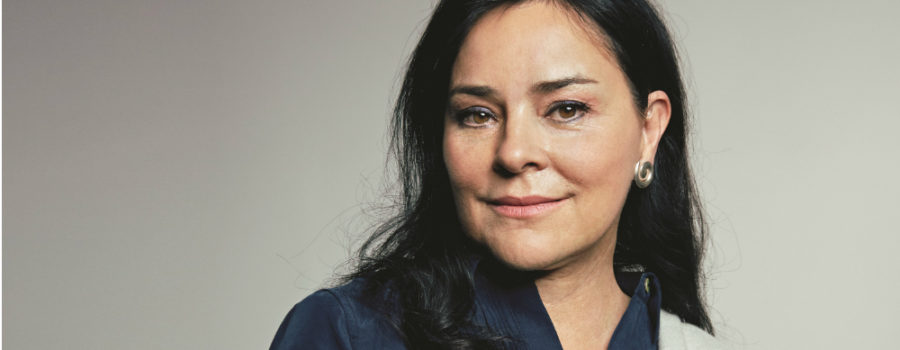



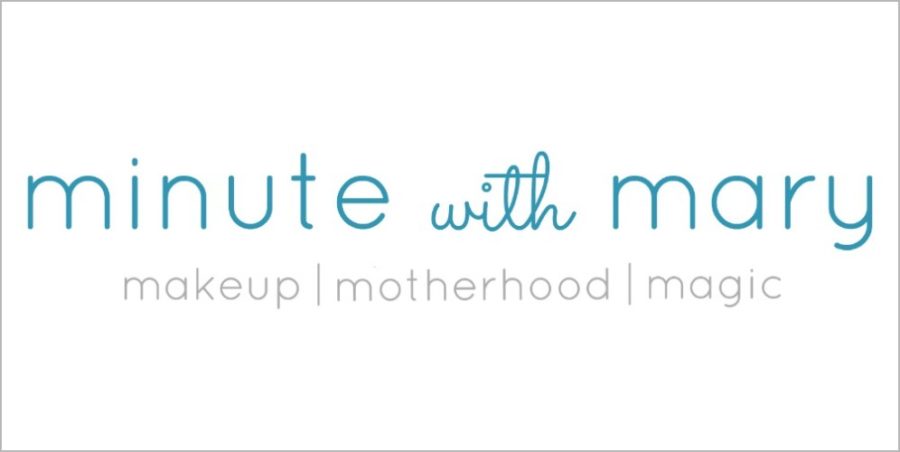
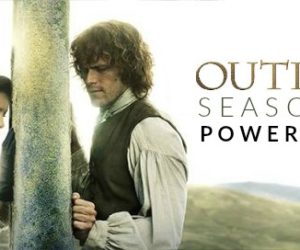
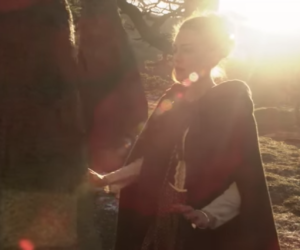
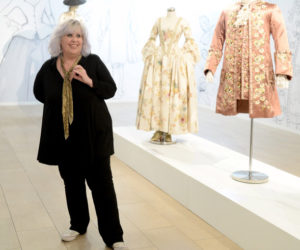
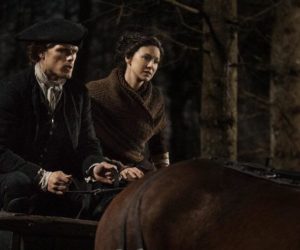





Leave a Reply
Your email is safe with us.